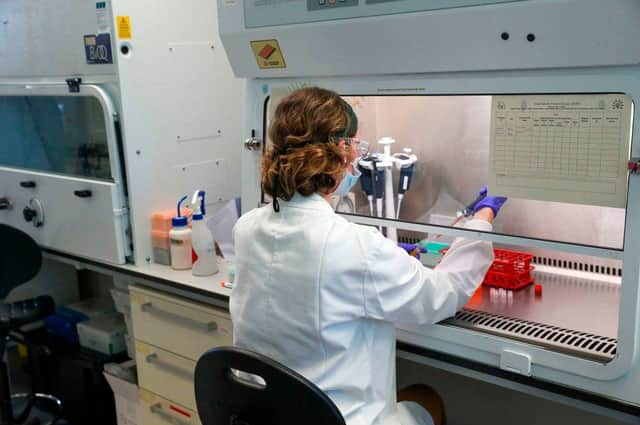University of Oxford vaccine: how it works and how soon it could be available


A coronavirus vaccine candidate developed by researchers at the University of Oxford appears to be safe and induces an immune response following human trials.
Early results indicate the vaccine could provide double protection - generating an immune response which stimulates the body to produce both an antibody and T-cell response.
Advertisement
Hide AdAdvertisement
Hide AdA vaccine has long been touted by MPs and experts as the safest route out of the coronavirus pandemic.
Here’s everything you need to know about the promising progress of the University of Oxford vaccine.
What is the vaccine?
The vaccine - called ChAdOx1 nCoV-19 - uses a weakened version of a common cold virus (adenovirus) which causes infections in chimpanzees. It has been genetically changed so it is impossible for it to grow in humans.
It is hoped the vaccine will make the body recognise and develop an immune response to the spike protein - recognisable in images of the virus - that will help stop Covid-19 from entering human cells and therefore prevent infection.
Advertisement
Hide AdAdvertisement
Hide AdWhat do the preliminary results suggest - and does the vaccine provide long-term immunity?
The results of the clinical trials, published in The Lancet medical journal on Monday, indicate that the vaccine candidate has triggered two responses in the immune system.
The first is that it stimulates the immune system to produce antibodies - proteins produced by the blood in response to antigens which are harmful substances that come from outside the body, such as from viruses or bacteria - and that it also causes the body to produce T-cells.
If the non-specific immune cells which respond to any invader instantly cannot tackle it, the T-cells come into play. These cells attack the virus directly.
Advertisement
Hide AdAdvertisement
Hide AdIt is not yet known whether the Oxford vaccine candidate provides long-term immunity.
What happens next?
More than 4,000 participants are already enrolled in the UK, with enrolment of a further 10,000 people planned as researchers test the ChAdOx1 nCoV-19 vaccine.
Trials are also taking place in South Africa and Brazil and it is hoped an effective vaccine could be ready later this year.
This trial aims to assess how well people across a broad range of ages could be protected from Covid-19.
How soon could a vaccine be rolled out?
Advertisement
Hide AdAdvertisement
Hide AdDr Adrian Hill, director of the Jenner Institute at Oxford University has suggested that high risk groups could be vaccinated in September if trials continue to be successful.
Hill also suggested that one million vaccines could be ready as early as September.